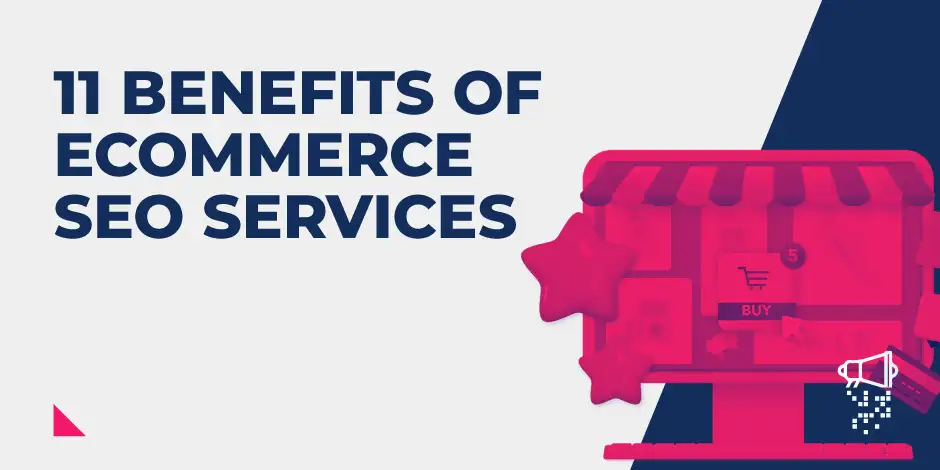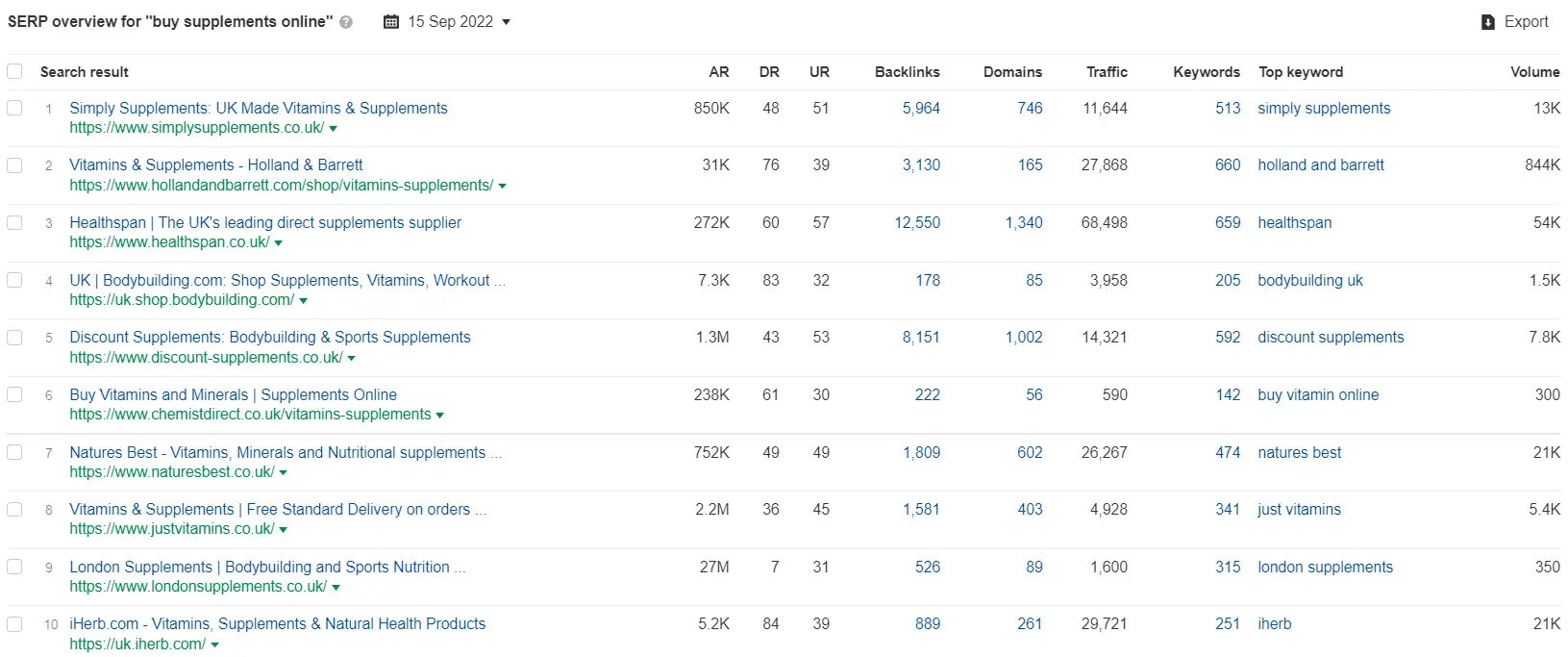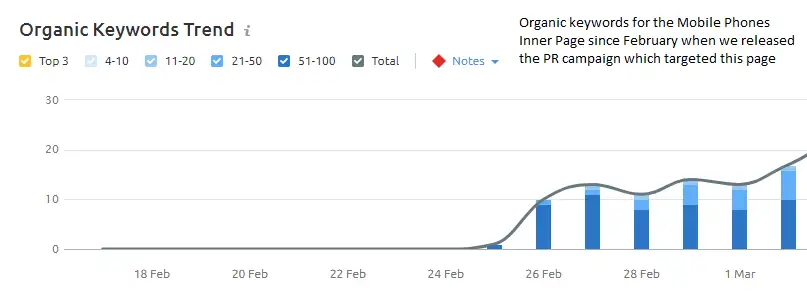
11 Benefits of eCommerce SEO Services
eCommerce SEO can be a hard sell—not because it’s lacking in benefits, but because people talk so much rubbish about it online. After the umpteenth LinkedIn post of the day promising “game-changing” eCommerce SEO tips, but offering very little substance, you understandably start to believe the whole thing is one big bandwagon not worth jumping on.
The trouble is, eCommerce SEO is a bandwagon worth jumping on. Some self-styled influencers just give it a bad name.
We’re here to cut through the crap. Want to know exactly what all the fuss is about? We're breaking down our top 11 Benefits of eCommerce SEO, including:
- Lower customer acquisition cost (CAC)
- Compete with industry leaders
- Attract high-converting traffic
- Take control of the user journey
- Stop wasting your time with beginner SEO
- Capitalise on seasonal trends
- Boost low-performing product categories
- Become a trusted thought leader
- Maximise brand awareness
- Identify hidden opportunities
- Generate long-term value
What is eCommerce SEO?
eCommerce SEO is the application of search engine optimisation tactics to eCommerce websites in order to increase organic rankings for user search queries, drive traffic to key pages and maximise revenue.
In this sense, the objectives of eCommerce SEO are no different from other areas of SEO. The difference is that eCommerce websites are generally larger and more complex than other sites. eCommerce SEO, therefore, requires specialised knowledge of how eCommerce websites are built and operate.
Read more: What is eCommerce SEO?
Why you should hire an eCommerce SEO agency
1. DIY SEO is a no-no
First of all, because you can’t do it yourself. Let’s get that out of the way. 
If you’ve spent more than five seconds in the online eCommerce community—particularly on LinkedIn, YouTube or Twitter—you’ve probably come across someone trying to sell you a DIY eCommerce SEO course, with the promise that it will transform your website’s potential and get you ranking above big-name brands.
That’s a lie.
Even the best eCommerce SEO agencies in the world don’t have some simple, three-step system for outranking household names. First-place rankings are possible, but not guaranteed, even with a full team of content marketers, technical SEOs and digital PR specialists on the job. If some dude in a polo filming a YouTube ad in his basement tells you he can make it happen, he’s trying to take advantage of your inexperience.
Now, don’t get us wrong. There are some amazing eCommerce SEO courses out there, but they’re mainly aimed at upskilling professional SEOs or at helping eCommerce business owners understand the basics so they can work more efficiently with an agency. They are not a substitute for a proper eCommerce SEO team.
Read more: "Why You Shouldn't DIY Your SEO"
2. Freelancers will not have the capacity
Second of all, notice we said “team”.
eCommerce SEO projects are too much for one person. This isn’t us dunking on SEO freelancers—we love freelancers! But it is plain unreasonable to expect one person to do the work of ten people.
Even if you were to assemble your own eCommerce SEO avengers—one person for technical SEO, a content strategist, a few copywriters and a digital PR specialist—these individuals would each be juggling different projects, different workloads, and would not have the streamlined communication of an agency team. Plus, it’ll probably be just as expensive, if not more, than hiring an agency if you’re paying for experts.
3. eCommerce SEO requires specialist knowledge
Finally… “won’t any old SEO agency do?”
No. You might get a recommendation from a friend who has a legal practice or a commercial construction firm, and decide it’s less risky to go with the recommended agency than chance it on an eCommerce SEO company you found online, but this would be a mistake.
SEO for professional services is a different beast than SEO for eCommerce. If your recommended agency has never optimised an eCommerce site before, you’re likely to find they are unprepared for the scale of the project and might have knowledge gaps in key areas, such as working with specialist content management systems (CMSs).
eCommerce websites are huge and complex machines. They can easily have page counts in the thousands and must be able to perform unique functions such as order fulfilment, payment processing and stock management. They are therefore usually built on specialist content management systems (CMSs).
With all this in mind, eCommerce SEO cannot be done effectively by your average Joe digital marketer. To reap the full benefits, you need to work with a specialist eCommerce SEO agency.
11 Benefits of eCommerce SEO
Right, let’s get down to business.
We could sit here and flash impressive stats at you about ranking positions and organic traffic increases, but we’re not going to. Why? Because that’s not what you care about. It’s all well and good having a spike in organic traffic, but that doesn’t mean anything until people are actually buying products.
You’re not an SEO, you’re a business owner, or perhaps a marketing lead. There is one benefit you care about above all others: “will eCommerce SEO boost our sales and revenue?”.
The answer is: if it’s done right, yes. When done by an experienced agency, eCommerce SEO is the drop in the ocean that has ripple effects across your business. These ripple effects ultimately lead to more sales, more revenue and more growth for your brand.
Enough waffling, let’s take a look at some of these ripple effects, shall we?
 1. Lower CAC (customer acquisition cost)
1. Lower CAC (customer acquisition cost)
If you’ve been in the game for a while, you may have noticed something over the past couple of years: customer acquisition costs (CACs) are through. the. roof!
The cost per acquisition (CPA) for eCommerce has risen by as much as 200% since the start of 2021. This is on top of a reported 60% increase between 2014 and 2019.
The reasons behind this, as with anything, are multiple. However, there’s a particular emphasis in the research into this phenomenon on the volatile profitability of social media marketing. Instagram and TikTok, in particular, are constantly updating their platforms to remain competitive, which has knock-on effects on how easy it is for brands to reach potential customers.
Meanwhile, the 200% increase in CPA since the start of 2021 can be traced back to an iOS update, which made it more difficult for brands to get value out of paid social advertising.
What if there was a more reliable solution that could provide balance in your marketing strategy? Enter eCommerce SEO.
According to data from Cleverbridge, a brand’s website is their most valuable customer acquisition tool, with an 89% probability of enticing new business compared to social media’s 72%. SEO has also been shown to reduce CPA by up to 87.41% on average.
And yet, many brands are still relying on social media as their main customer acquisition channel.
This isn’t an either-or decision—you can and should have the best of both worlds!
Social media can help cultivate a sense of brand identity and build online communities for your customers, whereas SEO helps maximise online sales and bring in reliable and sustainable levels of website traffic for a fraction of the cost of most other marketing methods.
2. Compete with industry leaders
Ah– we know what you’re thinking.
“But Reboot, didn’t you say earlier on that you can’t outrank household names?”
Well, not exactly. We said there’s no guaranteed system that’ll get you outranking big-name brands.
The reason for this is a little something called domain rating (DR) or domain authority (DR), both of which are widely-used SEO metrics that approximate how likely a particular domain is to rank. One of the main elements that goes into building a strong DR is backlinks—links from other websites pointing towards yours.
The biggest eCommerce brands—the eBays, Amazons and ASOSes of the world—tend to have extremely strong DRs of 70+. This is the result of being able to afford the very best eCommerce SEO services, as well as other websites just naturally linking to them because of who they are. As a result, they usually rank highly for their target keywords.
However, DR and backlinks are not the be-all and end-all—they’re just one piece of the puzzle. The intent of any search engine is to answer user queries with the most relevant and trustworthy results it can find. If there is a trustworthy domain serving up more relevant content for a particular query, a search engine will have no problem ranking them above a higher-DR website.
Take, for example, the SERP for ‘buy supplements online’:

In this example, Simply Supplements has a DR of just 48 but is outranking industry leader Holland and Barrett, which has a DR of 76. Although Holland and Barrett has the higher DR, Simply Supplements is a more relevant domain for the keyword ‘buy supplements online’.
You’ll also notice that all of the top-ranking results have hundreds, if not thousands of backlinks from unique referring domains—an indication that they are implementing an eCommerce SEO link-building strategy.
The bottom line: you don’t get to the top of the SERP by accident. The top-ranking websites in your eCommerce niche are all using eCommerce SEO to get there. If you want to join them, you’ll need to hire the experts.
3. Attract high-converting traffic
Once upon a time, in a kingdom just down the road (probably), retail brands used to dream: “if only I could focus all of my marketing efforts on customers I knew were interested in my products”. After all, half the people who see a billboard or a television ad, or heck– even a social media post, have absolutely no buying intent whatsoever.
Well—might as well stretch this fairytale bit to its natural conclusion—eCommerce SEO makes that dream a reality.
SEO is an inbound marketing strategy, which basically means that you don’t go out and find customers—you make the right customers come to you.
Let’s imagine you’re selling vegan protein shakes. If your website is optimised, then a customer typing “buy vegan protein shakes online” into a search engine is basically asking to find you and buy your products. It’s the digital equivalent of them walking past you in the street and going: “Man! I wish someone would sell me some vegan protein shakes right now…”. It couldn’t be easier.
This means that the majority of your website traffic is people with buying intent, which maximises your conversion rate. And guess what? If search engines think people are finding what they’re looking for on your website, they’ll bump you up even further. It’s a self-fulfilling cycle of win.
4. Take control of the user journey
One of the most common complaints SEO agencies hear from clients during the discovery stage is: “I’m getting plenty of traffic, but none of it is converting into sales!”
Now, there are a myriad of reasons why this could be happening, including but not limited to:
- Your onsite content isn’t answering the search queries it’s ranking for.
- Your Page Speed leaves a lot to be desired, leading people to click off the page before they’ve even seen what you have to offer.
- Your pages… How do we put this politely? Have a face for radio?
- Your site navigation is confusing and buries products under layers of subcategorisation.
- Your product search and filtering options don’t work properly.
All of these loosely come under the banner of user experience (UX). In eCommerce SEO, there is one question that will tell you everything you need to know about your site’s UX:
How easy is it for users to find what they’re looking for and make a purchase?
UX optimisation in SEO isn’t just about fixing the user journey, though. It’s about utilising it. Tracking user behaviour across the site—seeing which pages users are jumping to and where from—can give you insight into where you’re losing people, and, if you’ve got the right content specialist on the job, the power to gently guide users towards a sale.
5. Stop wasting your time with beginner SEO
This is the last time we talk about those DIY SEO courses, we promise.
But there’s another big reason you won’t be able to outrank the industry leaders in your eCommerce niche that we haven’t talked to you about yet. Want to take a guess at what that reason is?
It’s us. Okay, not “us” specifically, but eCommerce SEO agencies in general.
When you’re doing DIY SEO, you are attempting to use the absolute basics of SEO to compete with teams of people who are subject matter experts and apply that knowledge to national and international campaigns every single day. When you try to outrank ASOS, you’re not actually competing with ASOS—you’re competing with their SEOs.
It’s like taking a “Guitar 101” course and then jumping on the Pyramid Stage at Glastonbury (although that would be pretty awesome), or doing Couch to 5k and then challenging Mo Farah to a race.
You’re not an SEO, and that’s okay. You’re an entrepreneur, or a CEO, or a marketing director, and you’re great at it. That’s what you should be spending your time doing, not trying to teach yourself a completely new profession only to achieve middling results.
The best results happen when a focused, driven business leader meets a creative and experienced eCommerce SEO team. You do your thing and we’ll do ours, and let’s make some magic happen.
6. Capitalise on seasonal trends
Us SEOs, we love a good graph. SEO Twitter is about 75% graphs, as every last one of us geeks out over keyword trends. Sometimes, they even make the news. For example, when Queen Elizabeth II was lying in state before her funeral in September 2022, a 2,000% spike in the most British search query of all—”how long is the queue now”—made national headlines.
However, spikes in search volumes for particular keywords are good for more than just a funny headline. If your eCommerce SEO agency knows what they’re doing, they represent a huge opportunity to bring additional traffic to your website.
There are obvious examples of this: it doesn’t take an SEO whiz to figure out when people will be searching for “christmas decorations” or “halloween costumes”. However, it is highly likely that there are also seasonal spikes relevant to your eCommerce niche that an SEO expert can help you capitalise on.
For example, health and fitness queries—such as “protein shakes” and “fitbit”—increase significantly in December and January. Meanwhile, searches for “flower delivery” predictably spike around Valentine’s Day and Mother’s Day, as seen below:

Sometimes, the news cycle can also present opportunities based on how it influences keyword trends. In early 2022, Rihanna stepped out in some now-iconic maternity outfits, which led to increases in searches for “pink padded coats”, “ripped blue jeans” and “pearl necklaces”. Something similar happened in May 2022, when Apple announced the discontinuation of the classic iPod—suddenly everyone and their grandma was trying to find a second-hand iPod.
An eCommerce SEO expert will be able to identify spikes that are relevant to your industry and build a content marketing strategy to maximise the visibility of your pages during these periods.
7. Identify hidden opportunities
Every great eCommerce SEO project starts with a great audit.
Auditing might not sound like the sexiest part of a project, and we’ll be real with you—it isn’t. It’s a weeks-long process where we comb through every single page on your domain with a bunch of different SEO tools, make a whopping great spreadsheet and at the end, tell you where you’re going wrong in your eCommerce SEO strategy.
Now, all of that is very important, as it flags any major technical issues and lays the groundwork for the whole project. But the eCommerce SEO audit isn’t just about fixing things. It’s the springboard for all future creativity on the project.
SEO audits can and often do highlight untapped potential on your site. That might be a surprisingly high-performing page or product category that is ranking for keywords without trying and that you can expand on with sub-pages, for example. There also might be a strong demand for informational content that your underutilised blog section can capitalise on, or you could have a higher-than-expected DA, meaning that on-page optimisation efforts are likely to yield quick results.
This is why it’s absolutely crucial that your technical SEO audit service is performed by an experienced SEO professional who specialises in the eCommerce niche, as they will have the expertise to spot opportunities that others would almost certainly miss. These are most often found in eCommerce SEO agencies, who also have the ability to implement the audit’s findings. Once again, any old SEO service isn’t going to cut it.
8. Boost low-performing product categories
In SEO, problems come in all shapes and sizes. It’s not always “Help us, Reboot! Everything is a disaster!”. Sometimes, we get eCommerce clients come to us with much more specific SEO handicaps.
Let’s take OnBuy, for example. We’d been working with them for a while and overall, their domain was performing well.
However, it’s not uncommon for large eCommerce SEO websites to suffer with some inconsistencies in the rankings of their top-level category pages versus their inner pages. This is because the majority of link-building activity is usually directed towards the homepage, and page authority is passed down through the site via internal linking. Often, the inner sub-category pages are therefore last in line for their dose of link juice and are seen as less authoritative by search engines.
If OnBuy had found themselves in this situation while attempting to DIY their SEO, or while in the hands of a non-specialist SEO, they may have just had to live and let live. However, they were working with experts—us. We were able to roll out a target digital PR campaign that boosted the authority of their inner pages and immediately impacted their rankings.

Read more: OnBuy eCommerce SEO Case Study
The moral of this story is that if you’ve got a problem, an eCommerce SEO agency will have the answer and the internal resources to implement an effective solution. You don’t have to settle for subpar rankings on any of your pages, or cross your fingers and pray that users will click through your site to find certain products. You can capture traffic directly from a search engine and maximise your sales.
9. Become a trusted thought leader in your niche
It’s safe to say that the retail sector has changed quite a lot over the last twenty years.
The COVID-19 pandemic was the final nail in the coffin for some major department stores after a decade of declining footfall, forcing them to close their bricks-and-mortar doors for good, fast fashion has taken over from the high street but is facing competition from sustainable brands and 75% of people now shop online at least once a month.
But there’s one thing that has, and probably always will, stay the same: consumers still buy from brands they trust.
For 53% of buyers, trust is the most important factor in their decision to purchase, more so than price. Additionally, 90% of consumers are willing to pay more for products if they trust the company selling them.
“Okay cool, but what does this have to do with SEO?”, we hear you ask.
Well, consumers aren’t the only ones who care about trust. In fact, the world’s biggest search engine was built on the idea of using backlinks as a trust signal in order to rank the highest-quality content.
In a nutshell, Google—and all other search engines—wants to identify subject matter experts and reward them with higher rankings. The best way of portraying yourself as a subject matter expert to a search engine just so happens to be publishing high-value content for your target audience, which also helps build your reputation as a thought leader in your industry.
If you choose the right SEO agency, your strategy will therefore emphasise subject matter expertise in order to build trust with the two most important groups for your business’s growth: search engines and your potential customers.
10. Maximise brand awareness
Here’s a slightly depressing fact for you: the overwhelming majority of your website visitors are not there to buy from you. At least, not at first. In fact, 92% of first-time site visitors do not purchase anything.
Now, big disclaimer incoming: we’re going to assume that subpar SEO is to blame for at least some of that figure. After all, there are still millions of businesses worldwide that don’t have an SEO strategy, and therefore aren’t targeting customers with buying intent and optimising their UX for a higher conversion rate.
However, even with top-tier eCommerce SEO, you cannot strongarm a customer into buying from you. If anything, customers are getting more discerning and selective about who they buy from online, visiting a website up to nine times before making a purchase.
What you can do is throw your hat in the ring.
Around 81% of customers research brands and products before making an online purchase. A search engine user looking to buy a laptop isn’t going to type “buy laptop online” into the search bar and go for the first result that comes up. They’re going to want to narrow down their options, using queries like:
- “best laptops under £500”
- “macbook or chromebook which is better”
- “how much storage do i need on my laptop?”
- “which brand of laptop is the best?”
- “are there different types of laptop batteries?”
- “difference between OLED screen and an LCD one”
- “which is better, a 2in1 laptop or a traditional one?”
Imagine that, in addition to your product category page, you had published content targeting users’ research queries as well. This makes you more likely to pop up in all of their searches, both commercial and informational.
Using SEO keyword research tools like Ahrefs, an eCommerce SEO agency will be able to identify the exact queries your target customer is looking for and the on-page features that make a piece of content likely to rank for that term, and put together an eCommerce content marketing strategy that maximises the visibility of your website on SERPs across the entire customer journey.
11. Generate long-term value
Have you ever heard of the compound effect?
It’s a little principle where a series of small, seemingly mundane or insignificant actions taken consistently over a period of time eventually leads to huge rewards. A classic example of this is: Would you rather have $1,000,000 or would you rather have a penny that doubles every day for 30 days? Most people would choose the $1,000,000, not realising that the value of a penny doubled every day for 30 days is $5,368,709.12.
SEO is subject to the compound effect, as well.
The path is pretty simple: a great SEO strategy improves rankings for high-value target keywords, higher positions on SERPs lead to more traffic and more traffic increases the likelihood of a conversion. But it doesn’t stop there.
Meanwhile, conversion rate optimisation (CRO) is about keeping users on your website. This, in turn, is an indication to search engines that you’re providing value to users, and can result in higher rankings.
Higher rankings = more traffic = increased conversions… and so on.
Higher rankings can also strengthen your backlink profile, as other websites are naturally more likely to link to you without you having to outreach to them.
This is why SEO isn’t a one-time quick fix. It’s a process that reaps higher rewards the longer you stick at it. Over time, these compound benefits can easily grow your business into an industry leader in your niche.
Hire Reboot
Reboot Online Marketing is an SEO agency with a track record of reaping huge rewards for our clients in the online retail space. We’re talking first-page rankings and coverage from national and international publications, and that’s just a regular Tuesday afternoon for us. If you want to make a real commitment for the future of your eCommerce website, contact us today.